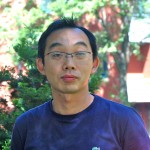Pharmacology Research Fellow wins Alzheimer’s Disease Research Fellowship
 Hirohide Asai, M.D., Ph.D., a physician scientist working as a post-doctoral fellow in the Laboratory of Molecular NeuroTherapeutics, was recently recognized by BrightFocus Foundation (formerly the American Health Assistance Foundation). Dr. Asai has been awarded a 2013 Alzheimer’s Disease Research Fellowship for his work on the cellular mechanism of tau dissemination under the supervision of Dr. Tsuneya Ikezu, Professor of Pharmacology and Neurology. Hiro is among a handful of recipients to receive one of the two-year fellowships, which carry a monetary value of $100,000.
Hirohide Asai, M.D., Ph.D., a physician scientist working as a post-doctoral fellow in the Laboratory of Molecular NeuroTherapeutics, was recently recognized by BrightFocus Foundation (formerly the American Health Assistance Foundation). Dr. Asai has been awarded a 2013 Alzheimer’s Disease Research Fellowship for his work on the cellular mechanism of tau dissemination under the supervision of Dr. Tsuneya Ikezu, Professor of Pharmacology and Neurology. Hiro is among a handful of recipients to receive one of the two-year fellowships, which carry a monetary value of $100,000.
Hiro is involved in finding a cellular mechanism to understand how tau protein, a primary component of neurofibrillary tangles found in Alzheimer’s disease brain, start aggregation in the specific brain region (entorhinal cortex) and stereotypically disseminates to the other specific brain regions (hippocampal fields). This has been pathologically known for many years but the exact mechanism is yet to be understood. He will elucidate the role of microglia and exosomal pathways for the uptake and secretion of tau proteins using molecular and cellular approaches.
Before joining Dr. Ikezu’s laboratory, Hiro had over 10 years of experience as a clinical neurologist, the last two years of which he worked as a staff neurologist in Japan. During this period he was responsible for the care of over 1000 Alzheimer’s patients or other neurodegenerative disease patients. His research career started in 2003 when he pursued a PhD in neuroscience, which he was ultimately awarded in 2009 with his thesis on the “involvement of the DNA repair system in neurodegenerative diseases”.
Hiro says, “Before coming here, I was wondering whether to be a physician or a research scientist. My experience in Dr. Ikezu’s lab and in this department helped me realize that I would like to be a physician scientist. Although it is very difficult to balance the weight of a physician (neurologist) and neuroscientist, I sometimes hesitate to engage in two trades, but in the end I believe that the hints for research can be seen in patients.” He also says, “I am grateful that Dr. Ikezu has made the most of my experience as a neurologist in our basic research projects. Under his supervision, my career goal as a physician scientist is coming into my view. One of my aims in joining this department was to work with and learn from the researchers who devote themselves to science.”